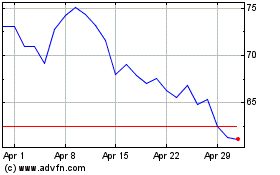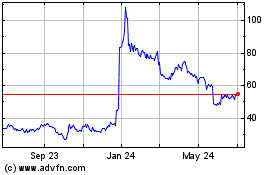Cytokinetics, Incorporated (Nasdaq: CYTK) today announced that
additional data relating to the impact of patient characteristics
on treatment effect in FORTITUDE-ALS, the Phase 2 clinical trial of
reldesemtiv in patients with amyotrophic lateral sclerosis (ALS),
were presented at the 31st International Symposium on ALS/MND.
Additionally, the company announced that the design of COURAGE-ALS
(
Clinical
Outcomes
Using
Reldesemtiv on
ALSFRS-R in a
Global
Evaluation in
ALS), a planned
Phase 3 clinical trial of reldesemtiv in patients with ALS and an
update on the IMPACT ALS Europe survey, a patient and caregiver
survey funded in part by Cytokinetics, were also presented.
“FORTITUDE-ALS provided important insights into
patient characteristics that may yield a greater potential
treatment effect, namely that faster progressing patients who
received reldesemtiv in the Phase 2 trial experienced larger
reductions in disease progression,” said Fady I. Malik, M.D.,
Ph.D., Cytokinetics’ Executive Vice President of Research &
Development. “These additional data have informed the design of
COURAGE-ALS which we hope to open to enrollment in 2021.”
FORTITUDE-ALS: Effect of
Reldesemtiv More Apparent in Faster
Progressing Patients
Jeremy Shefner, M.D., Ph.D., Lead Investigator
of COURAGE-ALS, Professor and Chair of Neurology at Barrow
Neurological Institute, and Professor and Executive Chair of
Neurology at the University of Arizona, Phoenix, presented
additional post-hoc analyses from FORTITUDE-ALS, the Phase 2
clinical trial of reldesemtiv in patients with ALS, evaluating how
baseline patient characteristics impacted the effect of treatment
with reldesemtiv versus placebo. When patients were divided into
faster, middle and slower progressing tertiles based on pre-study
ALSFRS-R progression rates, the middle and fastest progressing
tertiles of patients combined showed a 27% difference at 12 weeks
between patients receiving reldesemtiv versus placebo (1.15
ALSFRS-R points, p=0.011), compared to 18% (0.4 points; p=0.43) in
the slowest progressing tertile. In general, patients with a longer
symptom duration were slower progressors; 59% of those with SD
>24 months were in the slowest tertile. Most patients who were
minimally affected with an ALSFRS-R ≥45 at baseline were also slow
progressors. In comparing the treatment effect of slow progressing
patients with symptoms ≤24 months and a baseline ALSFRS-R score of
≤44 to the original primary analysis population, the effect size
and statistical significance increased, despite reducing the number
of analyzed patients. In an analysis of the total study population
(n=458), combining all patients who received reldesemtiv and
comparing to those who received placebo, the change from baseline
to week 12 in the ALSFRS-R total score showed a least square mean
(LSM) difference of 0.87 (p=0.013). However, limiting the analysis
population to patients with symptoms ≤24 months and a baseline
ALSFRS-R score of ≤44 (n=272), the LSM difference was 1.84
(p=0.0002). Together, these post-hoc analyses indicate that the
impact of treatment with reldesemtiv was more apparent in patients
with faster pre-study rates of progression, which include patients
with short symptom duration and lower baseline ALSFRS-R scores.
COURAGE-ALS: Planned Phase 3 Clinical Trial of
Reldesemtiv in Patients with
ALS
The design of COURAGE-ALS
(Clinical Outcomes
Using Reldesemtiv on
ALSFRS-R in a Global
Evaluation in ALS) was also
presented by Dr. Jeremy Shefner. This planned Phase 3,
multi-center, double-blind, randomized, placebo-controlled clinical
trial of reldesemtiv is expected to enroll approximately 555
patients with ALS. Patients will be randomized 2:1 to receive 300
mg of reldesemtiv or matching placebo dosed orally twice daily for
24 weeks, followed by a 24-week period in which all patients will
receive 300 mg of reldesemtiv twice daily. Eligible patients will
be within the first two years of their first symptom of muscle
weakness, have a vital capacity of ≥65% predicted, and a screening
ALS Functional Rating Scale – Revised (ALSFRS-R) ≤44. Patients
currently taking stable doses of Radicava® (edaravone) and/or
Rilutek® (riluzole) will be permitted and randomization stratified
accordingly. The primary efficacy endpoint will be change from
baseline to 24 weeks in ALSFRS-R. Secondary endpoints include
combined assessment of ALSFRS-R total score; time to onset of
respiratory insufficiency and survival time up to week 24 using a
joint rank test; change from baseline to 24 weeks for vital
capacity; ALSAQ-40; and bilateral handgrip strength. Two unblinded
interim analyses by the Data Monitoring Committee are planned. The
first will assess for futility, 12 weeks after approximately
one-third or more of the planned sample size is randomized. A
second interim analysis will also assess for futility, and there
will be an option for a fixed increase in total enrollment if
necessary to augment the statistical power of the trial. This Phase
3 clinical trial design builds on insights gained from
FORTITUDE-ALS, the Phase 2 clinical trial of reldesemtiv in
patients with ALS, further exploring the hypothesis that fast
skeletal muscle activation with reldesemtiv may be an important
therapeutic strategy in ALS.
IMPACT ALS: European Survey of ALS Patient and Caregiver
Perspectives
An overview of the ongoing IMPACT ALS Europe
survey of patients and caregivers was also presented by Miriam
Galvin, Ph.D., Department of Neurology, Trinity College Dublin. The
survey includes patients with ALS and caregivers from nine European
countries and gathered perspectives on the burden of disease and
disease progression, as well as input on the drug development
process. Recruitment of patients and caregivers was conducted in
partnership with the European Network for the Cure of ALS (ENCALS)
and advocacy groups in each country, and survey materials were
adapted from materials used in the United States for a similar
survey. Upon completion, statistical analysis of the data, as well
as a free text analysis of open-ended responses will be conducted.
The results will also be compared to the results from the survey
conducted in the United States in 2017. The data from this survey
will provide valuable information characterizing the patient and
caregiver experience and may help inform global drug development in
ALS.
About Cytokinetics
Cytokinetics is a late-stage biopharmaceutical
company focused on discovering, developing and commercializing
first-in-class muscle activators and next-in-class muscle
inhibitors as potential treatments for debilitating diseases in
which muscle performance is compromised and/or declining. As a
leader in muscle biology and the mechanics of muscle performance,
the company is developing small molecule drug candidates
specifically engineered to impact muscle function and
contractility. Cytokinetics is preparing for regulatory
interactions for omecamtiv mecarbil, its novel cardiac muscle
activator, following positive results from GALACTIC-HF, a large,
international Phase 3 clinical trial in patients with heart
failure. Cytokinetics is conducting METEORIC-HF, a second Phase 3
clinical trial of omecamtiv mecarbil. Cytokinetics is also
developing CK-274, a next- generation cardiac myosin inhibitor, for
the potential treatment of hypertrophic cardiomyopathies (HCM).
Cytokinetics is conducting REDWOOD-HCM, a Phase 2 clinical trial of
CK-274 in patients with obstructive HCM. Cytokinetics is also
developing reldesemtiv, a fast skeletal muscle troponin activator
for the potential treatment of ALS and other neuromuscular
indications following conduct of FORTITUDE-ALS and other Phase 2
clinical trials. The company is considering potential advancement
of reldesemtiv to Phase 3 pending ongoing regulatory interactions.
Cytokinetics continues its over 20-year history of pioneering
innovation in muscle biology and related pharmacology focused to
diseases of muscle dysfunction and conditions of muscle
weakness.
For additional information about Cytokinetics,
visit www.cytokinetics.com and follow us on Twitter, LinkedIn,
Facebook and YouTube.
Forward-Looking Statements
This press release contains forward-looking
statements for purposes of the Private Securities Litigation Reform
Act of 1995 (the “Act”). Cytokinetics disclaims any intent or
obligation to update these forward-looking statements and claims
the protection of the Act's Safe Harbor for forward-looking
statements. Examples of such statements include, but are not
limited to, statements relating to the potential benefits of
reldesemtiv; Cytokinetics’ continued evaluation of reldesemtiv as a
treatment for patients with ALS; and the properties and potential
benefits of Cytokinetics’ other drug candidates. Such statements
are based on management's current expectations, but actual results
may differ materially due to various risks and uncertainties,
including, but not limited to, potential difficulties or delays in
the development, testing, regulatory approvals for trial
commencement, progression or product sale or manufacturing, or
production of Cytokinetics’ drug candidates that could slow or
prevent clinical development or product approval; Astellas’
decisions with respect to the design, initiation, conduct, timing
and continuation of development activities for reldesemtiv;
Cytokinetics may incur unanticipated research and development and
other costs or be unable to obtain additional financing necessary
to conduct development of its products; standards of care may
change, rendering Cytokinetics’ drug candidates obsolete;
competitive products or alternative therapies may be developed by
others for the treatment of indications Cytokinetics’ drug
candidates and potential drug candidates may target; and risks and
uncertainties relating to the timing and receipt of payments from
its partners, including milestones and royalties on future
potential product sales under Cytokinetics’ collaboration
agreements with such partners. For further information regarding
these and other risks related to Cytokinetics’ business, investors
should consult Cytokinetics’ filings with the Securities and
Exchange Commission.
Contact:CytokineticsDiane
WeiserSenior Vice President, Corporate Communications, Investor
Relations(415) 290-7757
Cytokinetics (NASDAQ:CYTK)
Historical Stock Chart
From Mar 2024 to Apr 2024

Cytokinetics (NASDAQ:CYTK)
Historical Stock Chart
From Apr 2023 to Apr 2024
